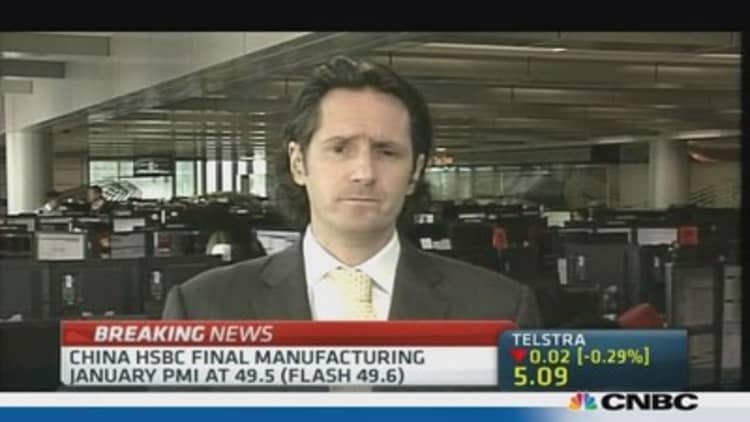
Activity in China's manufacturing sector contracted this month, a survey from HSBC bank showed on Thursday, indicating a weak start to the year for the world's second biggest economy.
The final Markit/HSBC Purchasing Managers' Index (PMI) fell to 49.5 in January from 50.5 in December, its lowest level in six months and compared with a flash estimate of 49.6 released last week.
The number is below the 50-level that separates contraction from expansion.
"Within the week, it [the PMI] didn't plunge further from our preliminary reading but it is below 50," said Frederic Neumann, co-head of Asian economics, managing director at HSBC.
(Read more: China's factory activity shrinks, first time in 6 months)
"We are starting the year on weak footing. Businesses are contracting even in the run up to Chinese New Year so coming back from the holidays next week, I would be curious to see whether factories actually fire up again or if they take another leg lower," he added.
Economic activity in China usually slows down in late January and early February as workers take time off and factories close down for the Lunar New Year holiday.
The HSBC survey showed that growth rates in output and new business weakened and that firms cut jobs at the fastest pace since March 2009.
(Read more: China banking worries 'way overblown': Wilbur Ross)
Last week's flash HSBC PMI reading, together with renewed signs of tightening in Chinese money markets, sparked concerns about a slowdown in China's economy and dealt a blow to global financial markets.

And some analysts say the outlook for growth in China could be key to stabilizing emerging markets, which have taken a beating from an outflow of foreign funds as the U.S. Federal Reserve unwinds its monetary stimulus.
"The final reading actually includes responses that were taken later during the month and some people suggested the figure could come in weaker still. This didn't happen so it's perhaps a slight silver lining that it didn't collapse further," Neumann said.
(Read more: China 'major' uncertainty facing global economy: Soros)
"The broad story is that China is decelerating. It's not a collapse but we need to see policy measures to support growth after Chinese New Year otherwise we might continue to slide," he added.
Asian shares extended losses with Hong Kong's Hang Seng Index tumbling 1.5 percent to a fresh five-month low following the China PMI data.
The Australian dollar, which is sensitive to China data, fell 0.2 percent to about 0.8719.
— Follow us on Twitter @CNBCWorld
Correction: This story has been updated to reflect the correct month in which manufacturing contracted.

